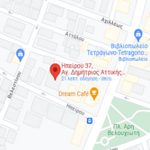Friday 19/05/2017
- “The role of Discomfort and Distress Crying in the Formulation of Self”
The way in which our environment treats the emotion or experience of distress and its expression through distress crying in infancy and childhood fundamentally determines the formulation of Self. Starting with Sylvan Tomkins’s’ theory of the punitive socialization of distress we will focus on how can we utilize distress as an agent of vitality and fulfillment.
Konstantinos Kostas, psychologist, social worker and Gestalt psychotherapist. Member of EAGT (European Association for Gestalt Therapy) and vice president of the Hellenic Association for Gestalt Psychotherapy (H.A.G.T.) and member of the Association of Social Workers of Greece. Gestalt Foundation graduate.
- “Figure or Ground? Bridging the gap in the paths of autism”
Autism attacks the sensory perceptual function of the brain. As a result each emerging experience has no way to be organized and interpreted in order to allow the individual to have a full mental and emotional experience. Using the principles of Gestalt Psychotherapy we intervene and train the senses, guiding the brain to a more complete perception of facts! The whole process of this psycho-education is based on the holistic approach of people, where the biological side is directly connected to the psychosocial side. The training uses as exercises the everyday events of the individuals’ life. This training can help an autistic person become more aware of each moment and function in his everyday life in a fuller way, always in his unique way!
Anastasia Varsamopoulou, Psychologist - Social Theologian, MSc Counselling, Gestalt Psychotherapist, Art Therapist.
- “The chronicle of a failed therapy”
Giorgos: Rama, are you satisfied with your therapy? Did you confront the symptoms or the causes of your difficulties? Did you have high expectations, reservations, and negativity or did you help and collaborated? Was your therapist experienced and charismatic or he just “gave up” with your case?
J Rama: At least he was happy with the therapy! JMaybe it had to do with the timing. And you,Giorgos, how were your therapy? Did you repeat the same things you do in life (succeeding or failing) or did you experience something different this time?
Giorgos: I think that it is important to find out what helped me and what blocked me the most, and where the chemistry between as worked. I hope that after some years, when the seeds of therapy will grow inside me, I will change opinion and fell that it was more successful than I thought!
Rama: And what is considered success in therapy? The relief? The change ? The awareness, the meaning, the freedom or the acceptance? Or something different for every patient (and every therapist)?
Giorgos (to you): Taking part in our presentation we hope that all of us will gain a clearer view of what we believe is failed therapy and what factors influence this outcome. And through awareness we might make a change or accept these perceptions.
Rama: Or simply we can spend our time pleasantly!
George Giaglis, MD, MSc, PhD, neurology specialist, psychologist. He has postgraduate studies in Medical Research Technology, in Statistics, in Cognitive Psychology and Neuropsychology and in Adult Education. He has been trained in Neuropsychiatry and Neuropsychology at London, UK. He has completed the 4-year training in Gestalt Psychotherapy at the Gestalt Foundation, Greece. He works and collaborates with various institutions as a trainer, as a researcher and as a therapist. He collaborates with the Psychotherapy & Training Center Gestalt Foundation, as a seminar coordinator. Trainer trainee
Rama Shadmon, MSc Social & Clinical Psychology, Gestalt Psychotherapist & Supervisor. She works with adults both individually and in groups. She collaborates with Psychotherapy & Training Center Gestalt Foundation as a supervisor both for individuals and for groups (W.M.C.A.)
- “Creative leadership: a new blueprint for our personal, professional and social life”
In this experiential presentation we will explore the role of leadership featured under the Gestalt approach prism as a fundamental factor in our professional and personal development.
We will experiment and put forward, in individual and group level, questions such as:
What does it mean and where does it serve us that which we perceive as leadership? What are our leadership features? How can we showcase them? Which forms of leadership provide health, evolution and growth on personal, professional and social level? What is a healthy function of leadership in a working environment? What are the new paradigms of healthy leadership in the social environment in an uncertain and desensitized world?
George Stamatis, B.A. (Law), H.S.D. (Marketing), M.Ed. (Education Adult). Gestalt Foundation Graduate (G.P.O.). Organizations and Business Development Consultant, trainer and coach in Greece and abroad. Gestalt consultant for companies and organizations (G.P.O.) has taught at the Athens University of Economics and UNYP Prague Universities and UNYT Tirana. Author of 12 books, including "The Art of change - Gestalt, a different approach for organizations", along with F. Meulmeester and I. Rizou.
Saturday 20/05/2017
- “Wrapping the world around our figure, like a ribbon in the hands of women sitting by the window dreaming”
This phrase by Fernando Pessoa, which already includes a beautiful metaphor for the perpetual in any process (“ribbon”), seems like a rare crack of motion, change of colors for him who few decades ago has shockingly praised nothingness, immobility, uniformity, resignation.
Today this phrase fits perfectly with the image that we have of a universe which erupts every moment, filling our eyes with wander, fear and dreams. But what happens when this ribbon gets stuck in our hands and instead of playfully wrapping it we feel it like a noose that tightens and bleeds us? When space-time becomes, in front of our eyes, an endless sad plain, where does continuation becomes uniformity? Ultimately is there time for the word “change” to have a meaning? Let’s talk about the line of temporality in the microstructure of human experience; about how we array on her the events of our life and the different and continuous images of our self; about how the music of the flowing moment never stops (regardless if we hear it or not), and like a crystal needle on a turn table incessantly engraves the vinyl of our personal experience with everything that we conceive as happiness, sadness, pain, absence, noise, encounters or silence. About how does the woman dreaming by the window manages not to entangle the ribbon in her hands…
Petros Theodorou, Gestalt psychotherapist, he is working in Greece and Europe, a member of E.A.G.T, an affiliate in training and other courses for the "GESTALT FOUNDATION”, “INTEGRATIVE GESTALT TRAINING INSTITUTE”; Since 2006 he has developed the embodied interaction approach PSP© (Process-Stage-Praxis) that focuses on existential issues as well as on romance-love-desire. By the end of 2016 he will publish in 2 volumes his wider research work on the philosophy that inspired Gestalt therapy.
- “Because the world when you share it exists…”
(Tasos Leivaditis, 1997, p. 109)
The world doesn’t belong to me absolutely (Lévinas, 1989).
But you motivate me to realize that I share the world (Lévinas, 1989).
And that I need You (the other) to exist in life (Mann, 2010).
Because as a human being through you I can become me (Apostolopoulos, 1991).
Because without you my history is impossible (Batler, 2009).
Because my ego becomes real through the sharing of my truth towards you. The grater the sharing the more real it becomes. (Buber, 1958).
“Because people, my companion, live from the moment they find a place in other peoples’ lives” (Leivaditis, 1997, p. 35)
… and life is when others touch you (Chimonas, 2008). “And I still remember that it wasn’t that piece of bread in itself, with its value that had moved me to tears at that moment … It was the human “something” that that person has given me-it was the look in his eyes and the worlds that accompanied that present …” (Frankl, 1972, p. 119).
And I simply share what I have with anyone who happens to be near me. And I feel happy and grateful when the other accepts my love, accepts my present. And the simplicity of giving entails that I don’t expect anything in return. And the more I share, the more I give and the more love and happiness I feel” (Osho, 2009; 2008).
Ioanna Goutzioti, Gestalt Foundation graduate. BSc in Psychology, MSc in Psychology of Child Development, & PGCert in Management.
- “…being in the cave of Plato”
The switching of figures, as a perpetual process of an infinite continuum.
The figure you form, reading these lines, becomes bleary, clear and does that depend on the lines? On the “images”? On me? On you?
The figure you form in the therapy room, depends on you? On the patient? On the diagnosis? Usually the question is what do I see?
Just think for a moment, who sees who?
The genuine observation, often times, is confused with perception; however for me perception prevents observation, to the point that eventually what we see is that we already know.
How will I encounter something new, constantly confirming that which I already know, how will a new form “emerge”?
We live in Plato’s’ cave and the light brings the shadows to life.
Perception kills the present and that is needed…
Observation is a much deeper genuine experience, sensual free of images. It doesn’t follow, it stands, it listens, and it sees and feels both the movement and the stillness. So much that I become a figure for you, you become a figure for me and this interaction creates motion, experiencing stillness, since nothing is important.
Paulos Koutroufinis, Psychotherapist, lives and works privately in Nafplion. He is based, in life and in work, on the Gestalt philosophy.
- “Are we born or made?”
Biological and social gender. Sexual orientation and gender identity. I wander weather I can recognize, around me and inside me, hate speech phenomena, thoughts and emotions that may denote fear of diversity?
My personal stance, in relation to LGBT* and human rights issues, as a human being and as mental health professional, inside and outside the therapy room.
*LGBT (Lesbian, Gay, Bisexual, Trans, and/or Intersex)
Irini Koutela, MSc Psychology, psycotherapist, Gestalt Foundation graduate, "External collaborator of mental health support line11528", D.E.A. Comparative Literature & dramaturgy studies.






